A group of individuals known as ‘preppers’ have revealed how they believe if the apocalypse comes, they’ll be more than ready for it.
As death tolls from war in various parts of the globe rise, the threat of nuclear weapons being unleashed continues to hover and fears of another pandemic are never far away, preppers have taken matters into their own hands.
The survival enthusiasts, seemingly increasing in number as political unrest and tensions between nations continues across the globe, say they’re preparing now for the worst case scenario – by stockpiling food, tools and weapons, burrowing bunkers and training themselves to survive in the harshest conditions.
In Britain, social media pages for UK-based preppers suggest the community is quickly expanding, with some groups having more than 23,600 members.
When Russia invaded the Ukraine, UK shop owner Justin Jones told The Guardian he did more than a month’s worth of trade in a day-and-a-half as fearful Brits stockpiled survival gear including ‘gas masks, nuclear protection stuff and potassium tablets’.
The latter, potassium iodide pills, are billed as a survival aid that could counter the thyroid gland from absorbing radioactive material in a nuclear attack.
Across the Pond? The same is happening. In the US, more than 20 million Americans engage in prepping, with a 2023 survey revealing that 51 per cent of the country were ‘prepared for disaster’.
Indeed, one constructor of survivalist retreats, Drew Miller, told The New Yorker, he was completely inundated with membership requests following the attempted assassination of President Donald Trump, as Americans increasingly feared civil unrest.
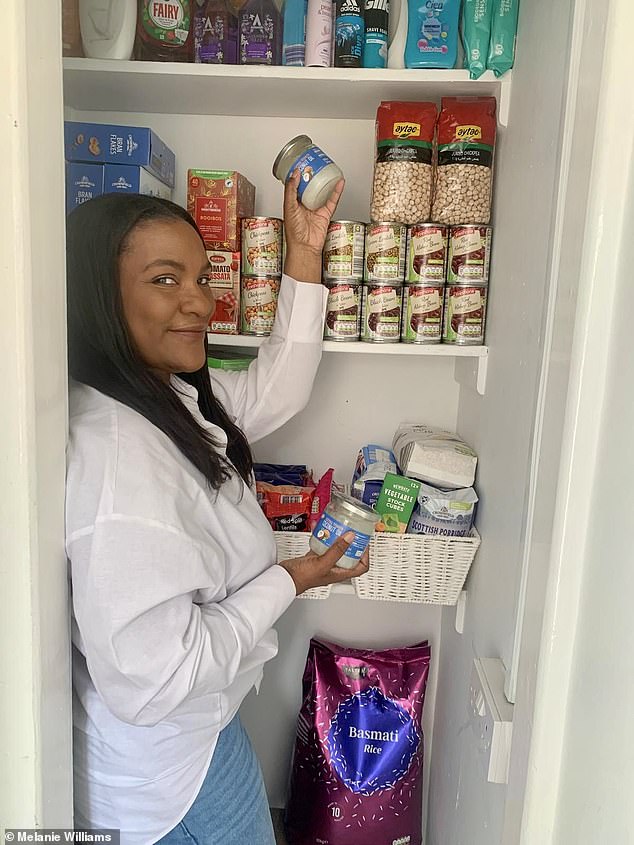
British prepper Melanie Williams, a wellness advocate and mother-of-six from the UK, has been steadily stockpiling food so she can be self-sufficient should supply issues and power cuts strike. Pictured
Bunkers, just one of many ways some engage in ‘prepping’, have even more recently become a status symbol for celebrities, with Mark Zuckerberg, Kim Kardashian and Post Malone among those said to have splashed the cash on post-apocalyptic accommodation.
The extent to which preppers engage in the habit appears to vary. At one extreme, there’s the doomsday preppers ‘readying for war, martial law and a complete deconstruction of society’ while others take a more moderate approach.
Melanie Williams, a wellness advocate and mother-of-six from the UK, is less worried about total societal collapse, but say she preps to always ensure she’s ‘one step ahead’…
Her well-stocked larder means she is prepared to combat most ‘everyday disruptions’ such as ‘rising food costs, supply issues, and power cuts.’
‘We have all seen how quickly things can change, whether it is global events or local emergencies. It is not about panic, it is about peace of mind and staying one step ahead,’ she said.
With six mouths to feed, she says she takes a ‘slow and steady approach’ to stockpiling, simply by ‘adding one or two extra items during my regular grocery shop, things like beans, oats, or a bottle of oil.’
She says she ‘decants many everyday items into glass jars and containers’ so that she can see what she’s got, and what might be going off, all of which she documents in written records.
‘Bulkier items like large bags of rice, oats, or flour go into food-grade storage buckets to keep them safe and organised long-term.
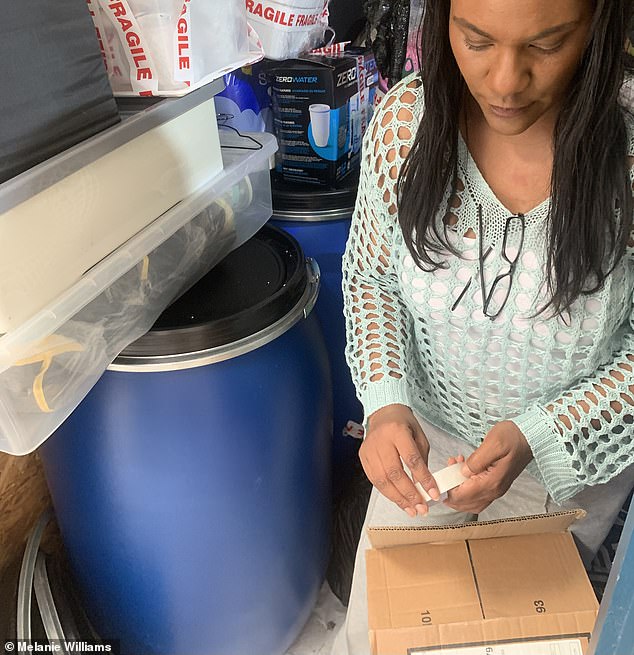
With a larder well stocked with food and other supplies, she is prepared to combat most ‘everyday disruptions’
‘I regularly update a detailed inventory to cross off what has been used or add anything new.
‘I keep a main pantry for everyday use, a separate one with surplus items, and a bulk pantry for long-term storage.’
Melanie also ‘preps’ by growing her own food and by investing time in reading up on and learning life skills.
‘We are also learning how to raise goats, chickens, and other animals to support our self-sufficiency,’ she said.
‘My boys tend to be more into survival skills, so I balance practical life skills with their interests.’
It’s something she’s been doing for a long time, having grown up with a mother who always had at least three to six months worth of food and supplies.
Though she has always taken an interest in being ‘prepared’, times of turbulence has also kept her motivated.
She described the Covid-19 pandemic as a ‘wake-up call’ that amplified her approach.
‘When people were queuing outside shops, I rarely had to because we already had what we needed at home. I have always kept a backup of essentials, something I learned from my mum growing up, she would always say to me have at least 3-6 months’ worth of food and water.’
While it’s a lifestyle she invests a lot of time in, she acknowledged that there is a broad spectrum of people who prep and their ideologies.
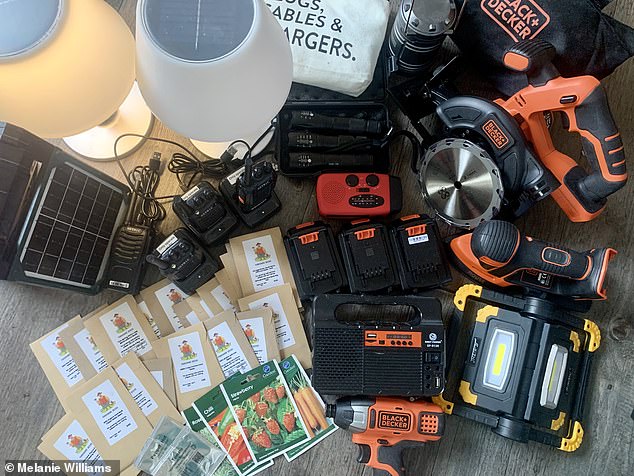
Melanie also preps by growing her own food and by investing time in reading up on and learning life skills
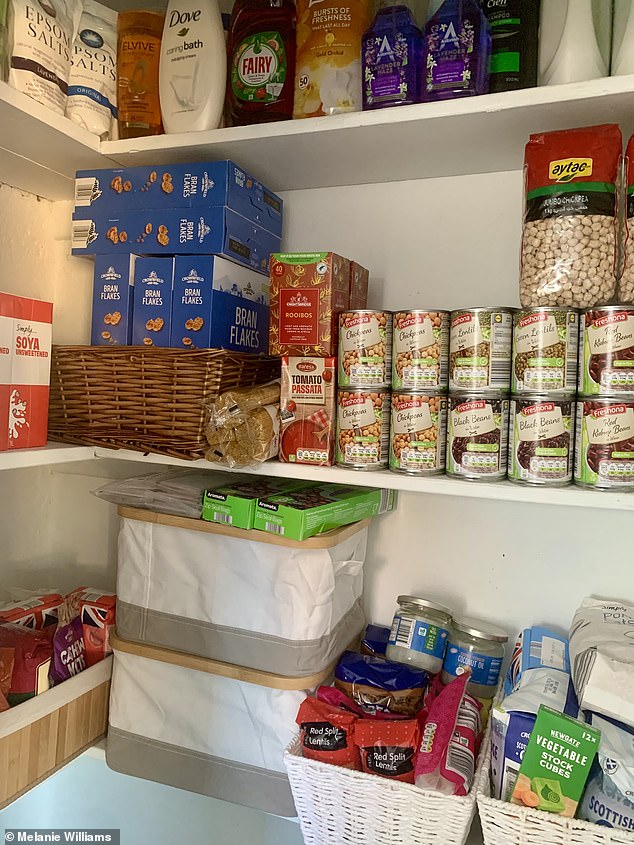
But for Melanie, her children are at the heart of her motivations for prepping, which are only a way for her to make sure she and her children are ‘secure’ and can have their ‘needs met’
‘Some people are private about prepping because they worry others might judge them or see it as extreme,’ she said.
‘Some may also keep quiet because they do not want to draw attention to themselves, and that includes being private about what they have.
‘You never really know how someone might act if they are hungry or desperate,’ she said, highlighting a common fear among preppers who worry about others stealing their stock.’
But for Melanie, her children are at the heart of her motivations for prepping. She said her main aim is to ensure they will be ‘secure’ and can have their ‘needs met’.
Charley Storey, a 27-year-old mother from the UK, takes a more extreme approach to prepping. She lives with her four-year-old daughter, Molly, and her partner, and constantly fears disaster.
She has spent the last two years prepping for ‘all worst-case scenarios’, which to her could be anything from natural disasters, to civil war, job less, illness, or the enforcement of martial law.
Her main reason for prepping is to ensure she can keep her daughter safe, something she believes is more important than ever given ‘the situation we’re in at the moment’.
Justifying her reasons for prepping, the self-described ‘doomsday prepper’, who works in care, said: ‘Seeing how scary the world really is now. Even the government is telling people to get prepared.
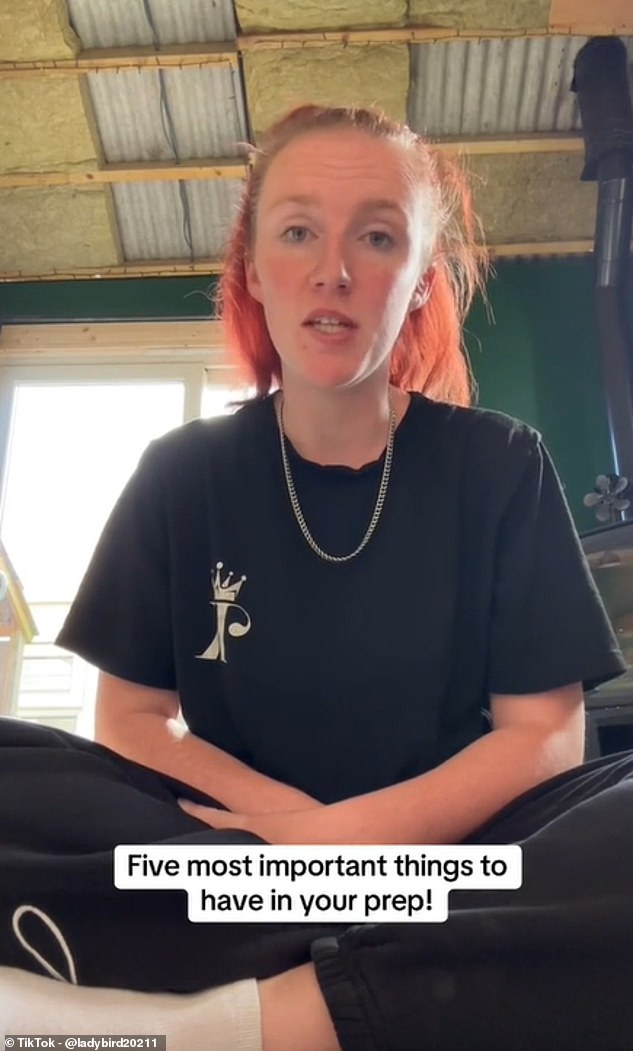
Charley Storey is a 27-year-old mother from the UK who lives with her four-year-old daughter, Molly, and her partner. Pictured
‘They have a page on their actual website,’ she said, referring to the official government website where advice is issued on how to prepare for emergencies such as ‘flooding, fires and power cuts’.
‘Everyone thinks the UK is really safe and it’s not. People think nothing is going to happen.’
Charley doesn’t trust the news, and believes official bodies are downplaying the severity of the situation.
‘The news doesn’t always tell you everything. It tells you what you want to hear. It’s dishonest about the true reality of the situation. That’s my own opinion,’ she stated.
At all times, she has a three-month supply of food – including tins, noodles and other long-life consumables – water, and medical supplies, a stash that she hopes to build to last several years.
Charley keeps her supplies in her utility room and also ‘rotates’ to keep things fresh. ‘I take old stuff and rotate it so nothing ever goes bad,’ she explained.
She first became interested in prepping two years ago when, afraid for the future of her daughter, she began actively stockpiling food, brushing up on her camping skills and learning how to purify water.
Now, she shares advice on her TikTok channel, with videos entitled ‘the five most important things to have in your preps’ and ‘how to prep on a budget’.
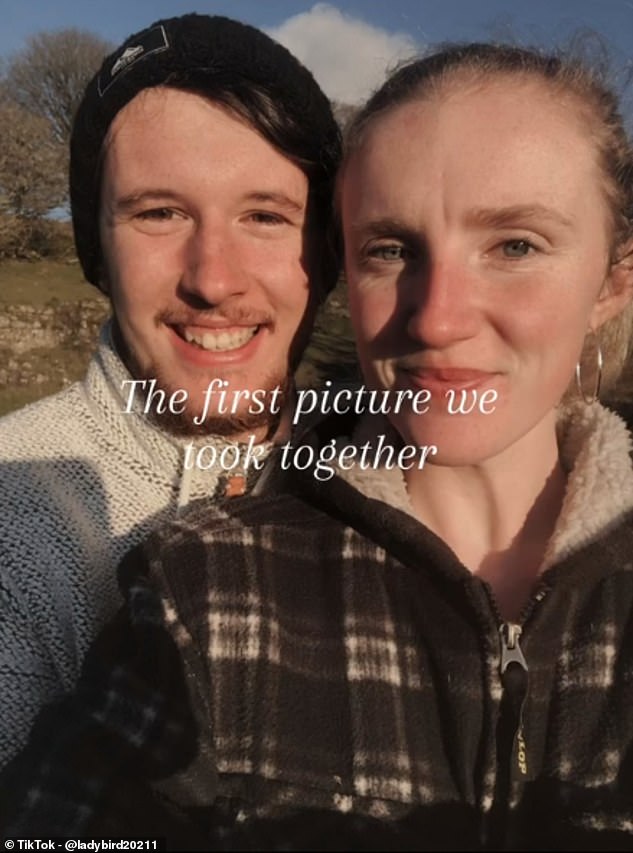
If worst comes to worst, the mother-of-one has a ‘bug out plan’ in place. This containing instructions on where to go and what to do in the face of disaster. Pictured with her partner
Important to Charley is being able to prep on a budget. She manages to do this by following the rule of ‘buy one now, two for later’, always ensuring she is topping up her supplies.
‘This is the thing that people don’t realise, it’s not expensive. I don’t buy branded food. I buy cans that are like 28p or 40p. Its all about being affordable and being in a budget,’ she said.
If the worst comes to worst, the mother-of-one has a ‘bug out plan’ in place. This containing instructions on where to go and what to do in the face of disaster.
While she isn’t able to afford a bunker, Charley has other places she could seek refuge, though she didn’t disclose where they were.
‘It’s all in my head. If you write it down, you’re as risk of everyone else knowing,’ she said.
Knowledge is also important. On her TikTok account, she urged her followers to ‘research and read as much as possible’, as well as attend first aid courses.
Unlike many other preppers, she isn’t so secretive about prepping that she doesn’t discuss it, regularly engaging in conversation and sharing tips online with others.
However, she is paranoid about what she described as ‘werewolf preppers’, who are ‘basically looters’ that form their disaster plans based on stealing the stashes of other preppers.
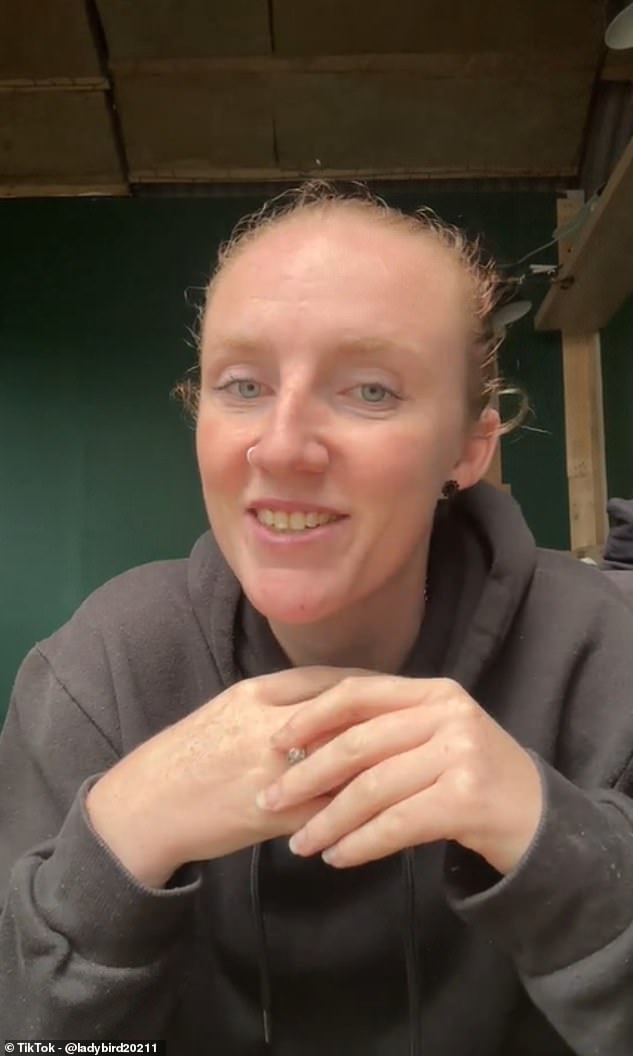
Charley preps on a budget by following the rule of ‘buy one now, two for later’
One of her main concerns, in the event of a disaster, is being able to protect herself without the help of guns, which Charley thinks should be made legal in the UK.
‘The problem in the UK is we don’t believe in the second amendment so how do we protect our families?’ she said, something which she would like to see change.
Nevertheless, she has found other ways of making herself feel protected. Rather than guns, she has stashes of bow and arrows and knives, both of which are legal to own in the UK.
‘I have things here that will protect my family,’ she said.
She thinks the current laws on guns are ‘unrealistic’ and hopes that things will change so she can be armed for potential disaster.
And while it is true that there has been a surge in interest for building and hiring underground doomsday bunkers, in reality, there is a far broader range of individuals prepping for a less ‘Hollywood’ kind of disaster.
One of those is Ryan, who hails Ohio from the US and is a father-of-two who has been actively prepping since he was a child.
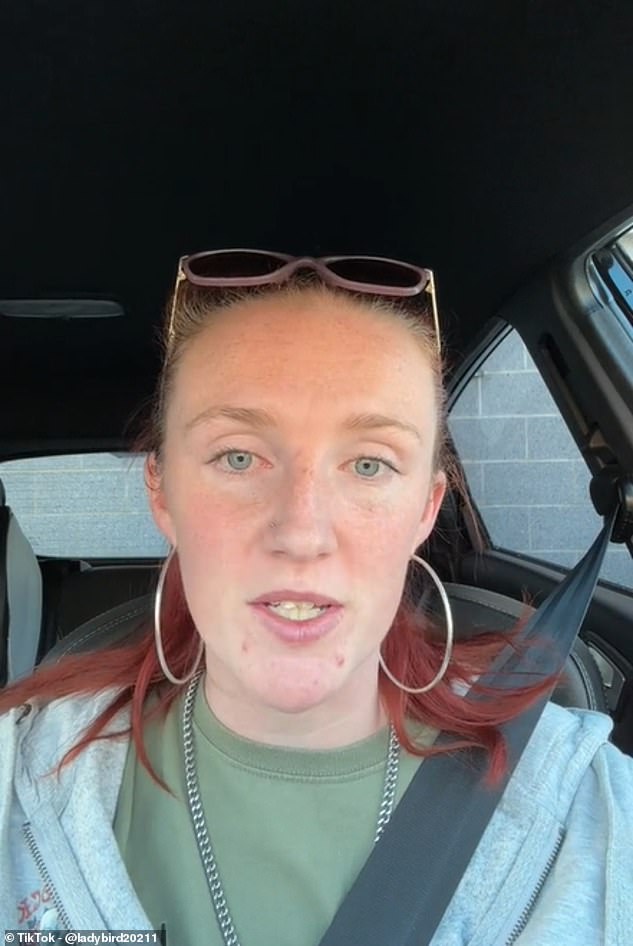
However, she is paranoid about what she described as ‘werewolf preppers’, who are ‘basically looters’ that form their disaster plans based on stealing the stashes of other preppers
He told MailOnline that he has been preparing since he was ‘in single digits’, having seen firsthand the impact of disaster while growing up in a small town called Joplin in Missouri, located in the infamous ‘Tornado Valley’.
Ryan, who now works as an IT administrator said: ‘Tornadoes are very fast and you need to be ready for them. Being prepared emergencies was always something I was mindful of.’
Growing up in a motorhome meant his family needed to be ‘prepared’ for the worst. To ensure their safety, they made arrangements with neighbours and made sure to have a well rigged ‘plan’ in either instances of staying or leaving.
In addition to having a plan, Ryan emphasised the need to have community. ‘You can have all the stockpiled like beans and rice and water that you want. But if you don’t have anyone else and you fall and hit your head, there’s not going to be anyone else to take care of you.’
Beyond a strong network, Ryan’s style of prepping is less ‘Hollywood’, and more focused on ‘being educated on things’ such as having first aid and radio training.
He also owns several weapons, including a rifle, pistol, and bow and arrow, which he practices to ‘keep up proficiency’.

Ryan Ley from Ohio, with his wife Cortney, and two sons Elliot (left) and Sam (right) pictured at the Cincinnati Zoo
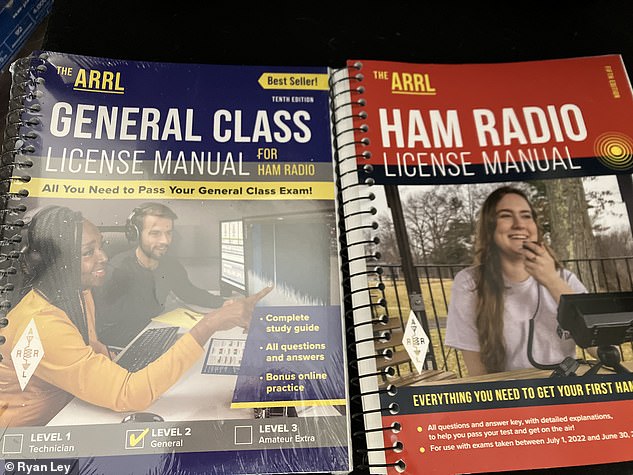
Beyond typical prepping techniques often associated with doomsday preppers, such as stockpiling amenities and bagging survival gizmos, Ryan also spends several hours a week ‘reading and exercising’ as part of his preparation. Pictured
‘You can have a thousand bandages, but if you don’t know how to correctly apply one, what good is the bandage.’
That being said, in the event of disaster, Ryan’s basement is well stocked with food and water, both which he regularly replenishes for freshness.
In the event of the worst, he also has printed out plans of what he would do, with step by step guides to confronting certain instances, such as the event of a natural disaster, instructions of skills such as how to purify water, and lists of amenities to try and secure.
He also owns solar panels and batteries that can can charge radios, computers, phones, and provide light in a pinch.
Beyond typical prepping techniques often associated with doomsday preppers, Ryan also spends several hours a week ‘reading and exercising’ as part of his preparation.
‘Most problems have been written about. Might as well get first-hand knowledge on what to expect,’ he said.
The father-of-two also runs between 12-20km a week as well as going to the gym. ‘If you aren’t taking care of your health you are going to be far less successful in any emergency where medical resources are stretched thin,’ he said.
He referred to prepping as a ‘hobby’ that he ‘habitually’ practices. In doing so, he also practices using firearms an is ‘currently learning to hand sew’.
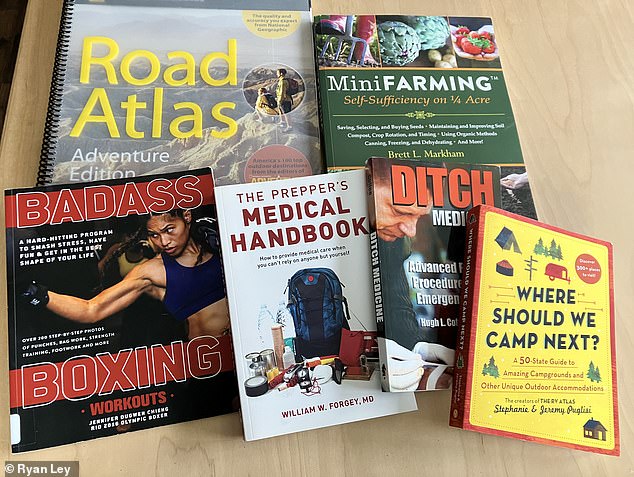
Ryan reads books on survival as part of his prepping in a bid to be clued up when his skills might be required
Not only looking out for himself, one of Ryan’s single biggest motivator’s for prepping for to secure the safety of his wife, Cortney, and his two sons, Elliot and Sam.
Having shared an interest in the ‘hobby’ of prepping, Ryan revealed his first ever gift to his wife was an emergency backpack filled with medical supplies, a change of clothes and tools to change a tire.
Ryan is more pragmatically minded that many might assume of doomsday preppers, foreseeing how he would cope in the aftermath of disaster rather than thinking of the ‘Hollywood’ version portrayed in fiction.
He said: ‘In a hypothetical zombie apocalypse, after the initial craziness of ‘there’s zombies and we have to fight them and stuff’, that’s scary and dangerous but there’s also living long term after a disaster which is insidious because it’s not what you think of. It’s not the sexy Hollywood thing.
‘You don’t need to buy a thousand cool gadgets or loads of food,’ he said.
Within the community itself, Ryan noted a ramping up in ‘conspiracy theories’ being shared on online forums such as Reddit and Facebook.
He blamed political turbulence, at home in the US and in other parts of the world, for increased interest in prepping.
‘We’ve spent the last 10-years watching norms being shattered, and when norms are broken, people get nervous. People like the same, even if it’s terrible but they still like it because they’re used to it.’
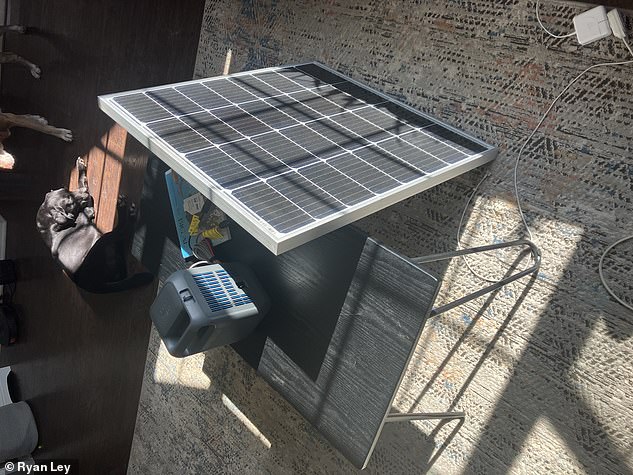
Ryan also owns solar panels and batteries that can can charge radios, computers, phones, and provide light in a pinch, pictured
Closer to home in the UK, Jon is preparing for a more extreme fate. Asked what he envisions ensuing in the coming years, he had an arm’s length list of potentially horrific eventualities.
‘The world is changing quickly, and the veneer of a civilized society is very thin,’ he said, adding that he foresees anything from ‘economic downturn, world war, civil unrest, natural disasters and climate change.’
‘The UK has been insulated from serious issues for a long time but the world is changing. I highly suspect something is going to happen. I want to be prepared for whatever this is,’ he said.
Wanting to secure his future against what he views as a probable outcome of disaster, Jon insisted that his main goal is to ‘become self-sufficient as much as possible’, which takes any number of forms, from food to DIY and car repairs.
He said: ‘We have a supply of food, fuel, first aid supplies. We have a remote cabin to escape to if needed. We have weapons and train to use them. not because we want to, but in a situation were the police are unable or unwilling to help we will need to defend ourselves or our property.’
Anticipating global disaster, Jon believes ‘everyone should have at least three weeks of food available’ just in case. This is on top of stockpiling cash, spare parts for repairs and medical supplies.
It’s advice that is no longer merely the thoughts of doomsday conspiracy theorists, but that being given by officials as global tensions continue to dominate headlines.
Earlier this year, The European Commissioner for Humanitarian Aid and Crisis Management, Hadja Lahbib, urged people to prepare survival bags.
They advised nearly half a billion people across 27 countries to prepare a 72 hour survival kit, stocking up on bottled water, energy bars, a torch and waterproof pouches for IDs.
For British-born Jon, preparations aren’t something he does alone. Ensuring his family is also ready for the worst, he encourages them to ‘train’ and ‘learn skills’.

Chris, 24, from Canada is also preparing the for the worst. He chose to remain anonymous for the article (pictured)
‘We practice fire lighting, camping, tracking and hunting weekly,’ he said, adding that physical fitness and medical training were equally as important.
Not only does this ensure he and his family can survive, but it gives them skills that could prove useful should disaster strike.
‘Having a tradeable skill such as welding will help you,’ he insisted. ‘For instance, being able to stitch a wound or repair a car in return for a meal for your family, or a spare part you need.’
He said he ‘always believed something was going to happen’, and initially thought this would be Covid, a period which he said opened his eyes to ‘how all around the world governments were not prepared, and did little to help the people’.
‘It really highlighted how alone you are. Your family’s survival is down to you alone.’
That being said, his rigorous prepping is not something he is open about with others. Choosing to keep his identity a secret, the Jon said there are two primary reasons for keeping the habit hidden.
‘Preppers are considered crazy by many, and subsequently shunned as conspiracy nuts.
‘They were blamed for the COVID shortages because of stockpiling. In reality the preppers were the ones not going to the stores because they prepped months in advance.’
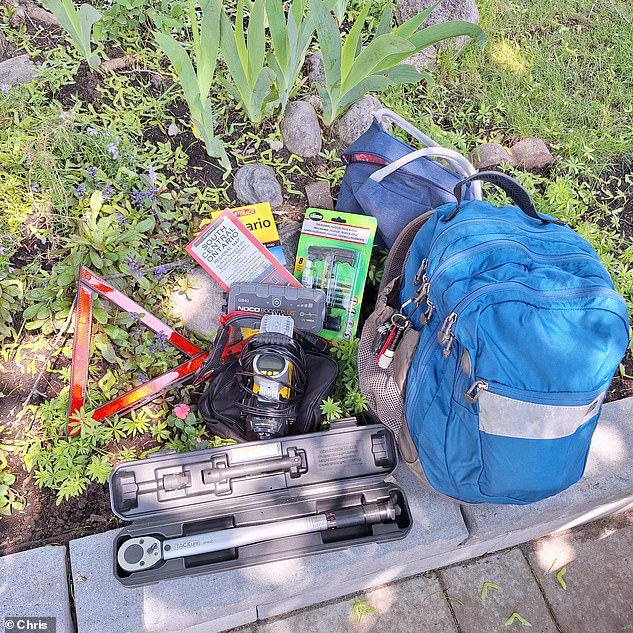
Pictured: Chris has laid the groundwork for disaster by preparing stores of 100+ gallons of drinking water, as well as three months worth of food and a multitude of firearms ‘and other weapons in the unlikely event they’re needed’
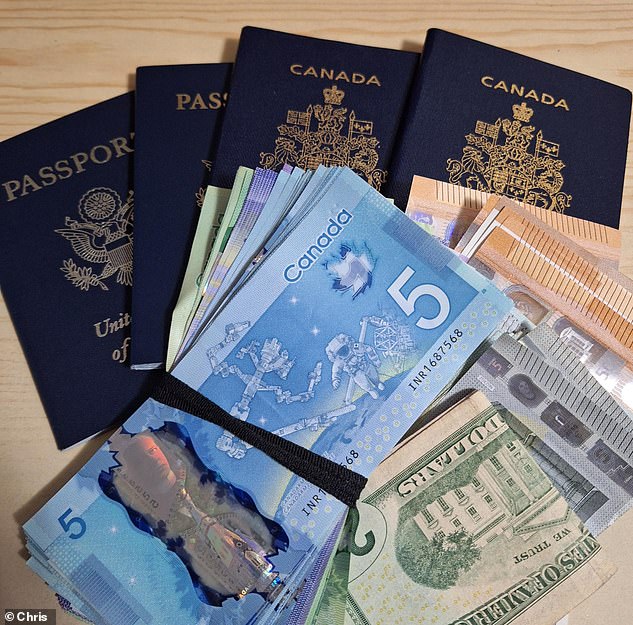
Chris also has stores of small currency in case internet outages block bank transfers, pictured
Not only does he fear judgement, but Jon predicts the inevitable knock on the door from friends and acquaintances when disaster strikes, a scenario that would lead to rapidly depleting resources.
‘If people know you have food and supplies, in a grid down situation, they will be knocking on your door asking for stuff, or worst-case using force to take it. This is the primary reason for weapons. We need to defend ourselves against these types of attack.’
Secrecy is common among preppers, Bushra Shehzad, who is researching prepping for a PhD in marketing and consumer behaviour at Newcastle University, told The Guardian.
‘They are sceptical of people who aren’t part of it asking questions, which I think is because they’re portrayed in a manner that many of them don’t agree with,’ the expert told the publication.
Chris, who chose to remain anonymous, from Canada, is also preparing the for the worst.
The 24-year-old works as a public servant in project management and has been emergency prepping for for the last five years.
Much like Ryan, he is less concerned about the possibility of a zombie apocalypse and rather the more realistic possibility of ‘day-to-day emergencies’ such as ‘house fires and flat tyres’.
He told MailOnline he has laid the groundwork for disaster by preparing stores of 100+ gallons of drinking water, as well as three months worth of food and a multitude of firearms ‘and other weapons in the unlikely event they’re needed’.
He also has stores of small currency in case internet outages block bank transfers, passports ‘to flee the country as a last resort when things seem dire’, and even a ‘Get Home Bag’ packed with ‘several days of supplies’, to come ‘in handy for sudden evacuations.’
More concerned with the realities of severe weather and other more ‘every day’ potentials for disaster, Chris’s preparations take a less extreme form, such as monitoring the Environment Canada weather app on a regular basis.
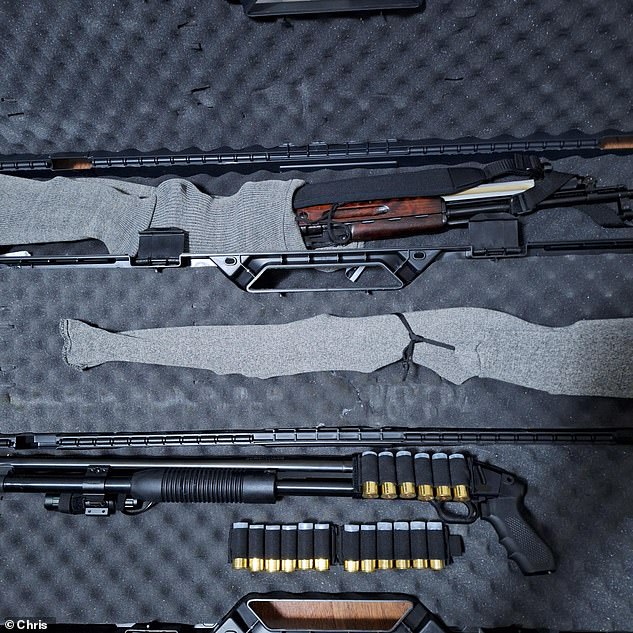
Chris, from Canada, has stores of firearms to protect his family should his idea of the worst case scenario happen
Despite having a system in place for if things go wrong, Chris is secretive about his prepping, largely out of fear that others will turn to him and demand help in the case of disaster.
‘I do not tell people about my prepping unless there’s no chance they’ll come to me in the event of an emergency (e.g., a colleague on the other side of the continent), and I still keep things vague in case word spreads,’ he said.
‘The family members I talk to about prepping usually start off thinking I’m paranoid until they need my help such as jump starting their car, getting a flat, or during over the counter medicine shortages.
‘Most won’t take these incidents as a wake-up call to start taking their own preparations more seriously.’
For Chris, the pandemic hitting in 2020 was the start of his trajectory into prepping.
‘The COVID-19 pandemic opened my eyes to the fragility of the systems we rely on,’ he explained.
‘I never thought I’d be in a situation where the government could force us to stay at home and stop working for months at a time, and see significant disruptions in the supply chain. This was a pretty mild disease too.’
Being prepared is more than just having a ‘fully stocked bunker’, Chris said, adding that many of the more traditional doomsday preppers ‘over emphasise’ prepping for ‘unlikely events’.
One of his many methods for ensuring he is prepared is to maintain physical fitness, adding that ‘most people in the US and Canada die from health related issues, like heart disease, and not nuclear war or the electrical grid permanently going down.’
He said: ‘What’s the point of preparing for a nuclear war if you’re so out of shape that you die of a heart attack in your 40s?
‘What good will your fully stocked bunker do you when you lose your job and the bank forecloses on the property because you didn’t get your finances in order? Where’s your house’s water shutoff valve if something starts leaking?’











